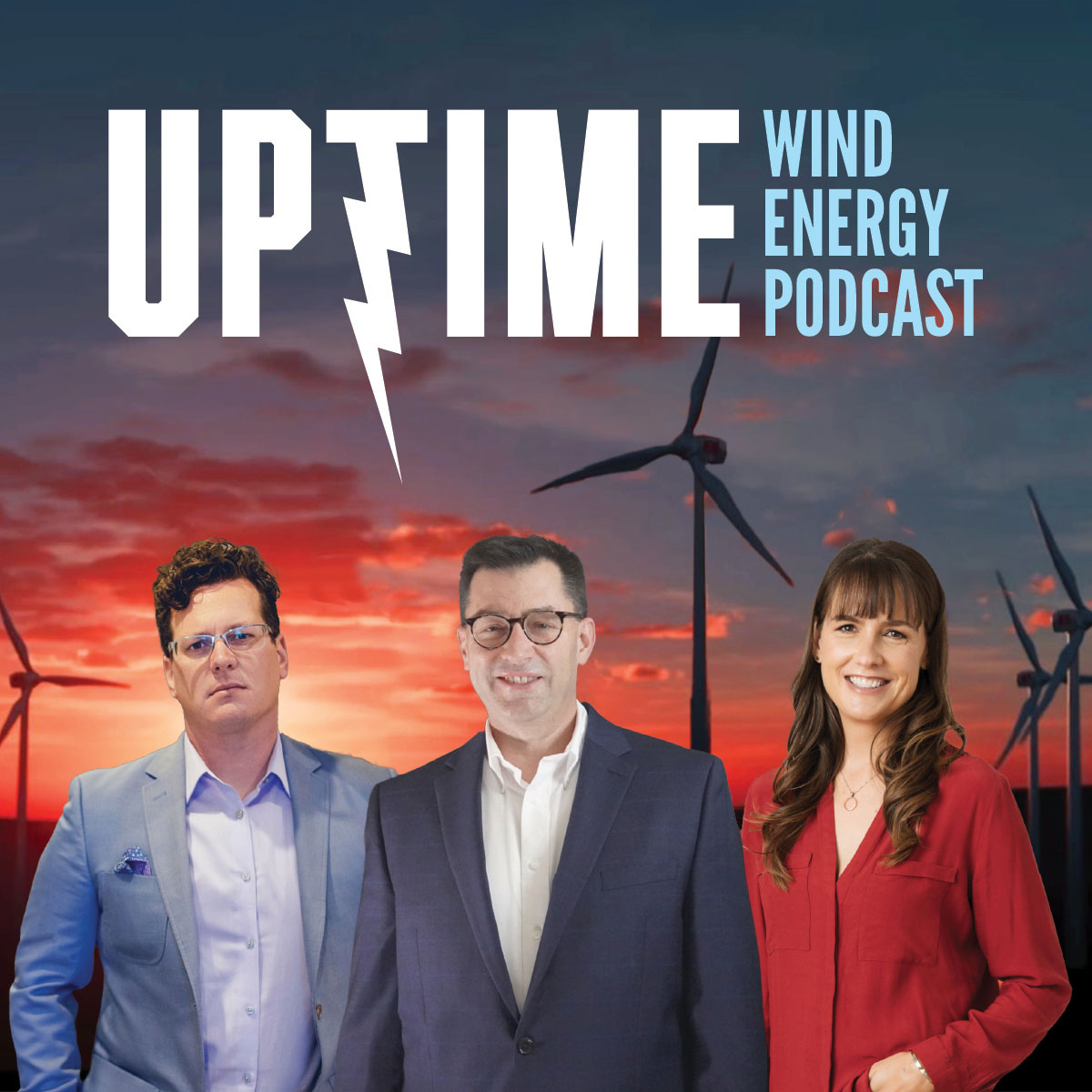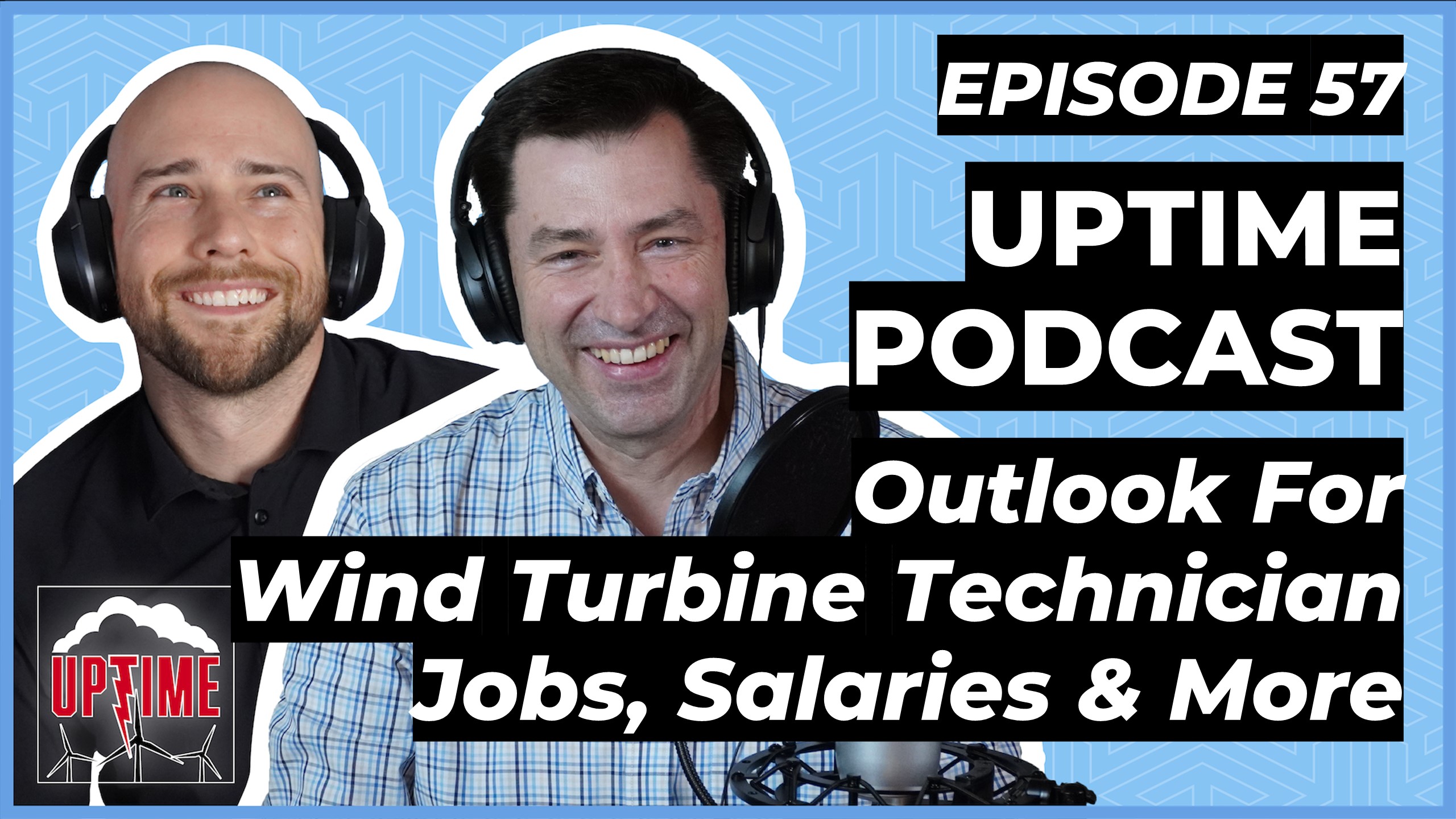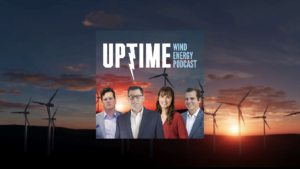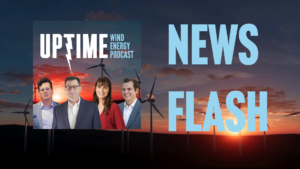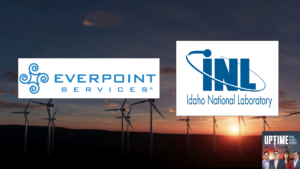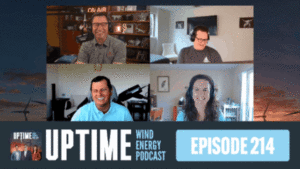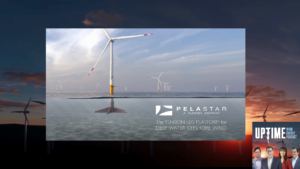The job of wind turbine technician, or wind tech, will continue to be very in-demand in the future. But what exactly does it entail, and what can job seekers expect down the road? In this episode of the Uptime Wind Energy Podcast, we discuss the future prospects for wind techs as the industry grows technology, safety equipment, and the turbines themselves, evolve. Read our in-depth article on wind turbine tech jobs here.
This episode is sponsored by Weather Guard Lightning tech. Learn more about Weather Guard’s StrikeTape Wind Turbine LPS retrofit. Follow the show on Facebook, YouTube, Twitter, Linkedin and visit Weather Guard on the web. Have a question we can answer on the show? Email us!
Podcast: Play in new window | Download
Transcript – EP57 So You Want to Work As a Wind Tech? Outlook, Salaries, & Future of this Evolving Job
Dan Blewett 0:00
This episode is brought to you by weather guard lightning tech. At weather guard, we make wind turbine lightning protection easy. If you’re a wind farm operator stop settling for damage turbine blades and constant downtime. Get your uptime back with our strike table lightning protection system. Learn more in today’s show notes or visit weather guard wind calm slash strike tape.
Allen Hall 0:28
Welcome back. I’m Allen Hall.
Dan Blewett 0:30
I’m Dan Blewett. And this is the uptime podcast where we talk about wind energy engineering, lightning protection and ways to keep your wind turbines running.
Unknown Speaker 0:47
Alright, welcome back to the uptime podcast. I’m your co host, Dan Blewett. On today’s show, we’re going to talk about wind turbine technician jobs and what the outlook like look what the outlook looks like for the future. So first, let’s say hello to my co host, Allen Hall. How are you sir?
Allen Hall 1:04
Hey, good, Dan,
Allen Hall 1:04
boy coming out post COVID things are looking positive wind turbine industry is still rolling along. Good stuffs happening.
Dan Blewett 1:12
Yeah. So obviously, with the new presidential administration here in the US, you know, wind power is getting a big boost. And obviously, offshore wind especially is growing really, really fast all over the world. And when you start to look at the jobs outlook, you know, wind turbine technician is one of those really hot jobs at the moment. Because obviously, more and bigger wind farms are going up. And we need people with that expertise to help maintain them, you know, service them, repair them, inspect them, all that stuff. So Alan, let’s start here today with a little bit of the job and how it’s evolving. So obviously, you know, in the past, if you talked about, you know, what does a wind turbine tech do, you know, aside from, you know, climbing up, you know, through the tower up to the nwsl, doing all the, you know, the ground based checks, you know, monitoring, inspecting all the equipment, and then the cell itself, but there’s also the rope access part of it, which is really hazardous. It’s a pretty interesting job, because it’s highly variable, depending on maybe your narrow focus, like you might be more into, like the hydraulic side of it, or the electrical side or the blade side. But that job is also going to evolve a lot. I mean, what do you see a wind turbine technician doing in the future as drones and robotics, and a lot of automation starts to take place? Yeah, I
Allen Hall 2:34
think what you’re gonna see is more and more automation and computer interfacing with computers and electronics to run the turbines. And so not only do you have to and understand power electronics and and sort of power distribution, transformers, those kinds of things. You’re also need to know how to program a programmable logic controller or PLC, you need to be able to dye diagnose digital equipment, network lines, that kind of stuff. So there’s a lot of more computer technology and winter runs, and there has been in the past 20 years is becoming more and more of a data accumulator. And, and diagnostic information is going digital too. It’s just you need a really diverse set of skills. And to be wind turbine technician, it’s changed a lot.
Dan Blewett 3:26
Well, and you know, one of the common Google searches is, you know, do you need a college degree to be a wind turbine tech, you know, what kind of education do you need? So currently, you don’t need a college degree, but you do need a certificate. So you have to go to technical school or community college or one of these great programs that’s, you know, training you because this is obviously not an easy job. But do you see the the educational court requirements going up or just changing? Or, I mean, obviously, there’s going to evolve because like you said, there’s going to be a lot more technical skills, not just like the working on with your hands kind of skills. And it’ll always always be a pretty hands on job, which is, I think, great in this time of everything’s, you know, a screen. But there’s going to be more automation, there’s going to be more like you said, data mining and analytics stuff. And of course, there’s lots of different, you know, segments and lots of different jobs in the wind energy market. But do you feel like those certificate programs are gonna get more rigorous? Do you feel like a degree program might be possible in the future? I mean, where do you see, you know, this job go as far as education wise? Well,
Allen Hall 4:30
I think this specific job training is going to still exist, you’re going to still need those certifications to get around wind turbines, just from an insurance standpoint, you need to have competent people around when terms could you can’t get hurt out there. So you need to know you need to know what you’re doing and you need to have some experience with it. So I think those sort of entry level and mid level training programs are very valuable because that’s a that’s a skill that can never take away from you. Right. So once you gather that little skill skill set, you can apply it to turbines, pretty much across the world, obviously, there’s differences between manufacturers, which we’ll learn as you go along. But essentially, it opens the door to a whole bunch of opportunities. And the college degree thing I think is, is the one I’m not so sure makes a lot of sense. I know, there are some programs that are starting to focus on wind turbines. But always, one of the interesting things about the wind turbine industry is the number of at least in the US, it seems like there’s a lot of service people, former service people, people that have been in the military, they get involved in it one because they tend to be a little more adventurous type, they tend to be in pretty good shape. They’ve probably picked up a skill or been trained in the military to not work, not afraid. Yeah. Right. So it’s kind of like one of those really good candidates that they sort of come in prepared, right, they’re prepared for all kinds of things. And to be able to adapt on the fly, which is what a lot of wind turbine technicians do is is because you’re never sure what you’re going to get into. And you need to be able to adapt. And I think the military servicemembers have a unique advantage there. But you can also learn a lot of those skills going to some of the junior colleges that are around, there’s, it’s but it is important, you have some basic skill set, right, you need to have those sort of foundation pieces, and a lot of it is on the job training after that.
Dan Blewett 6:21
Yeah, well, that’s actually true what you said about veterans, the wind industry employs veterans at a rate 67% higher than the national average. So that’s all 100% true. Do you see a lot of people from sort of adjacent industries like those maintaining power equipment, like transmission lines, you know, like, Sure, yeah, cell towers construction major going into this field?
Allen Hall 6:44
Sure, because it just takes a set of skills, that’s broad in nature, right. So there’s a you need to know something about welding, you need to know something about how motors work, you need to understand how electronic cabinets are set up, you need to understand things about safety, right, there’s a lot of safety involved in this and the safety equipment. So there’s, it’s it sounds odd that but the because wind turbines seems like a very narrow field of work, but the skill set you need is extremely broad, right? Because you’re working in cold weather working in hot weather, working in windy weather, obviously. So the little skill set you pick up becomes the surely that toolbelt of things you can do, which makes you more valuable as you go along. And and that’s what I found with a lot of technicians as they start off, you know, obviously, learning it’s like in the entry level position is, but by the time you put four or five, six years in boy and your, your skill set is really good. And those technicians are pretty smart. And a lot of them do come from things like automotive fields either go with their hands, and you know, understand how mechanical things work, or they they know something about electricity, and motors and circuit breaker panels and that kind of thing. So they’re electricians, those are great starting skill sets to earn more money and the wind turbine industry.
Dan Blewett 8:04
One and how important you like the physicality aspect of it is because if you’re especially going to be working on rope access, yeah, it’s a pretty physical job, it’s a pretty mentally demanding job to you know, being up at height that can kill you are going through all the safety checks and being comfortable with that. I mean, it seems like you got to have a certain, you know, zest for adventure and a certain tolerance of risk and, you know, a certain reverence for, you know, some of these machines that can potentially hurt you.
Allen Hall 8:32
Yeah, well, it tends to be a young person’s game, you don’t see a lot of wintermute technicians in their 50s, definitely not in their 60s. And you do occasionally see, I saw one the other day that was I think they’re in their 70s. So but it’s it’s there is a lot of things that evolve strength, right. And a lot of up and down as you get older, you don’t want to do that so much. And the technicians that have been around a long time do transition to that managerial role with overseeing a number of sites, and they’re, they’re managing a bunch of people, and they’re keeping track of the costs. And they’re keeping track of where the equipment is making sure all the materials are on site when they need to be. So there is there is a transition that happens naturally happens in industry, because you need well, knowledge people managing the organization later on, as well as you need the younger people climbing up down the ropes. So there’s a broad spectrum of jobs that need to be done. But some of those some of those things can only happen that sort of the higher paying managerial positions can only happen if you have in the service time actually working on the components. So you have to put in your time.
Dan Blewett 9:41
Yeah. So we’ll get to like salary and pay in a second. But I want to stick with the safety thing a little longer. So one of the things I find interesting is that, you know, you talked about it being a younger, more able person’s game, being up in the turbines or on the turbines, but robotics companies are Definitely threatening, not threatening, like, I mean, there’s a positive thing. But there, Jones into change that where no drone, you know aerial drones can do a lot of the work that used to require ropes to crawl crawling and cable managed robots can do a lot of the service repairs on blades. So what’s interesting is it sounds like technicians who are maybe ready to transition off the really physical labor part of it maybe getting a little older, and maybe their body’s just like, hey, I’d rather be on ground a little more this point which we all hit that point, almost like an athlete or a military person.
Allen Hall 10:35
Sure.
Dan Blewett 10:35
You know, they’re going to be automating some of those jobs into safer on ground, more technical roles that don’t require you to be up on ropes. I mean, do you feel like that’s going to be it’s a, it’s definitely gonna be good for aging workers in the industry, because they can stay in it. They don’t have to feel like I’m 55 I don’t want to be on ropes anymore. It’s kind of it’s becoming tough. Sure, now I can just fly drones, I can control, you know, a robot and do the same work that I’ve been doing, because I’m, I’ve built all these skills. But now I don’t have to be up there anymore. Which is great. Right? I mean, do you see that being a continuing trend, where automation is going to help people do safer jobs, but similar jobs, but from the ground? Sure, I
Allen Hall 11:18
think there’s a natural transition there anyway, especially since we have really good cameras on drones and very accurate drones and capable drones to do it, you’re gonna see a lot of a lot of activity happening on the ground, that’s definitely going to happen. And then as we move more and more offshore, were being on a rope offshore on some of these larger turbines is definitely a little more risky. Let’s put it that way. Right, there’s a lot more consequences there. That you’re going to see more and more sort of ship based drones and ship based activity that’s happening, where you’re going to be on on the water on the ground. And one of the key parts to all this is sorry, not knowing what you’re looking at, right. So as you if you have done this job for a little while, I become extremely valuable because you learned all the intricacies to the different turbine manufacturers and what you’re looking for. So if you are commanding a drone, you kind of have an idea of what you should be looking for what areas you want to focus on. Because it’s important to your customer to know, hey, we’re looking for these kind of cracks, or these kind of D laminations. Or this kind of rain erosion. Because we’ve seen so many these turbines, we know where to go, look, that’s a huge valuable piece. Right? So the expertise in the industry can only make you more valuable later on.
Dan Blewett 12:41
Yeah, so going to salary so the US Bureau of Labor Statistics. And I apologize, don’t apologize. I don’t have global data for this, but it may 2020. According to the US Bureau of Labor Statistics, the median salary for winter wind tech was 56,000 to 30, the lowest 10% or in less than 40,000. And the highest 10%, more than 83,000. Where do you see this this salary point? Going in the next five or 10 years? I know, we try to stay away from projections for sure. But you know, demand for this job is going to go up. The amount of people need to do this job is going to go up and how does that gonna affect you know, salaries there?
Allen Hall 13:25
Well, I think part of the salary discussion is driven by the location of where wind turbines are operating today. And the vast majority of them are in the middle of the United States or in the south in Texas, where the cost of living is just lower. Those showers are really good salaries, but you got to put them in perspective, you were talking about living in New York City, maybe not so good. If you’re talking about living in West Texas, probably pretty good. or living in Iowa, that’s pretty good salaries. Especially if you’re you know, 24, and you’re making 60 6070 grand, that’s a good gig. And plus, you know, you can throw in overtime to write for a lot of those jobs. So I think that’s the salary basis. Good. But you know, the kicker is going to be when those offshore wind jobs start popping up, they’re going to start be paying a premium. They will have to pay a premium. It’s like being an all
Unknown Speaker 14:17
rig oil rig. Yeah,
Allen Hall 14:19
yeah. And there’s a premium that you get paid. And a lot of those guys that I I know from the engineering side we’re making 100k years ago because of the dangerous nature of it or the adventurous nature of everyone to call it. They were getting paid for that too. So it didn’t take long for a lot of the offshore jobs to be paying a lot more and you saw a lot of younger people, if they would be willing to be on an oil rig or in this case, it’s going to be on an offshore wind turbine. Make a lot of making making a lot of cash.
Dan Blewett 14:56
Yeah, and of course, you know the piece about cost of living and Where these are located. That’s important. Of course, you know, the lifestyle of a winter vintec is also important because, you know, if you want to be living in a big city like I live in downtown DC, it’s probably not a realistic job for you, right? Because it would take me literally nine hours to commute out to anywhere I want to go to find a wind turbine from here. But you know it? Do you see with this, the whole COVID pandemics been interesting, it’ll be, you know, be interesting to see how this plays out in the future. Because a lot of people have less left cities, they’ve said, Why am I gonna live in a city, I’m working from home anyway, I can pay a third of the rent, or half the ran or two thirds, the ran wherever you are in, in the suburbs, or out in the country? do so with the exodus of people from cities, which you know, who knows how that will continue? Maybe it will work? Maybe it won’t? Do you feel like that’s gonna make these jobs more realistic for a lot of people. It’s like, Hey, I just left this big city. I’m out here in the country, and there are wind turbines around, I could work on one of these sites potentially are uncomfortable with this lifestyle? Sure, um, you know, it seems like people could be more apt to living that sort of more rural, slightly more remote kind of life.
Allen Hall 16:09
Right? Well, that’s in the United States. The trouble has been is that a lot of the jobs have transitioned away from rural areas to more populated centers, leaving the smaller rural communities with really little industry left. Well, that’s going to reverse itself, obviously. And you’re already seeing that in a number of places, particularly Highland, Texas, and some others other states where the wind turbine industry is driving smaller communities into some sort of revitalized state. And I think you’ll see the same thing when you get to the offshore wind, just because when the offshore wind, you’re going to start seeing a couple of different levels happen here, you’re going to see factories put near the shore, you’re going to see, obviously technicians near the shore, you’re going to see shipboard people, people that it can work on ships, managers knew how to move things on and off as ships being located. So you’re going to see a shift in demographics, on what I would call rural areas on the coastlines of the United States, you’re going to see that shift also. So former shipping centers that have lost their way over time, because you know, the global marketplace has changed, you’re going to see those changes, also, you’re going to see those areas of those other countries, if you have an existing dock and a disposition infrastructure, you’re going to see the wind turbine companies start to flock around those places, which means there’s going to be new jobs, which is fantastic.
Dan Blewett 17:30
Yeah, and you wonder how this will play out for the rest of the world as well, like China, obviously, was a leader in adding new, you know, wind capacity in 2020. And it’s really expensive to live in, you know, in big cities, Hong Kong, yeah, big city. And so you have to wonder if this is going to put good paying jobs, you know, hypothetically, in a country like China, far away from the cities, but that’s good for everyone. Because it’s so hard to have enough space. I mean, you see some of these big city centers all over the world, it’s just so expensive to live there, and have the kind of lifestyle that you’d want, if this can sort of like be a little bit of an equalizer. And like you said, especially with the ecosystem of factories, and blades being built and shipping and all that stuff, where you could see where maybe there’s like a port, like on the water in Texas were this sort of town that can you could drive two hours inland and be at a number of wind sites. So it makes sense for you to live there. Or you could hop on the boat and go out to the off offshore sites. And you could be working in the shipyard or working at the blade, factory, etc. And you can see some of these little hubs perhaps maybe getting built up because lots of different things in the same and adjacent industries are just within an hour, two hours drive, that could make sense,
Allen Hall 18:47
right, as we get more offshore shore wind licenses set up, that’s where the factories are going to go. That’s where all the money is going to go through all the shipping is going to go. And as we know, in a lot of different industries, the area of the country that sets it up first has sort of the market capability to handle it is the one that’s going to win, right? So if you’re up and down the eastern seaboard of the United States. And you can get set up first and get that little in the industry running before your next door neighbor state, you’re going to be the winner of that long term. And you’re already seeing that play out now. We’re Pennsylvania, Delaware, Maryland, New Jersey, Rhode Island are all pushing for the same thing, essentially. And I think we all know that first one there is going to be the leader. And that’s where they want to go because of the number of jobs is going to create right and long term and in theory, long term jobs. Once you get an offshore wind site set up. You’re talking about a 2030 year lifespan. That’s that could be for a lot of jobs for a long time. Right. So there’s a huge advantage and that sort of the stability of those jobs, I think is is a key ingredient here. Anybody has worked in the sort of the power industry called Natural Gas nucular. Those are long can be long term positions, right? So once you have that skill set and you want to stay in an industry, you pretty much can write, it’s not going to change all that much. It can’t, it can only get bigger, essentially, or until it went a nuclear case, I could totally decommission it, but not on the winter. benci got you got a good 20 year run. And I think that’s important in terms of stability. If you’re starting a new family, you want to have that stability in a job. Right. And I think the offshore is going to provide that to a lot of future technicians. It will.
Dan Blewett 20:35
Yeah, and of course, you know, some of the other adjacent industry, the construction industry, like they’re going to be building a lot of wind farms. And of course, some of the pushback against green energy. Is that Yeah, there’s a lot of construction jobs. But once these farms get built, especially there’s a criticism with solar is that how many people does it take to run a solar farm? Not very many, whereas those more in favor of gas and coal, they say it takes lots and lots of people to keep a, you know, a coal operation running or gas plant, oil plant running. So, you know, maybe valid criticism there that you don’t need as many people. And so maybe it’s not as many jobs long term, but I don’t know that. Is that realistic? Is that or is that a kind of too myopic view? I mean, what’s your take on that? No,
Allen Hall 21:23
if we’re really going to play a wind turbine power for the long duration, let’s say next 50 years, right. So now we’re talking generational groups of technicians and employees coming through? Because if and I think this is what’s likely to happen, right, and we’re starting to already see it in parts of Texas, so turbines that have been there, out in the field for 1520 years, where they’re going to do, are they going to turn them off, they’re going to leave them running and then refurbish them, there’s more work, right? If they’re going to refurbish, there’s a bunch of work if they want to basically take out the existing turbines and put in a larger turbine, which is also a strong possibility. There’s a lot of construction jobs. So it just sees it’ll move around the country as we go. But essentially, you’re going to have a sort of a staggered effect of every 20 years once, once a site has sort of run its useful life. And we have much more efficient turbines, which we will and much larger tournaments, we’re going to retrofit. So those jobs are going to come back around so that the the person that was pouring concrete, out in West Texas for a pad 20 years ago, is probably going to end up doing in roughly the same place. Right? It’s going to circle back around. Yeah, that’s that’s huge right to have that sort of repeating business thing happening in terms of an economy can be very useful, because the employment effects it has.
Dan Blewett 22:45
Yeah, plus, we can repurpose some of these sites, as amusement parks and put zip lines between turbines. I mean, you know, gogit business idea that would be terrifying and awesome at the same time. So if anyone wants to go through that you have, I’ve gifted my my idea there to you. zip lines between decommissioned turbines?
Allen Hall 23:06
Well, I think I think the one thing to keep in mind in the wind turbine industry is to realize how stable it is, relatively speaking, because you have very, very large player long term players. Yeah, right. Ge, Siemens, Gamesa, Vestas, Nord x, all these large industrial companies are not closing their doors tomorrow, that’s not likely to happen, right? So there is that you have the ability to make a good salary and have, you know, a good place to work and live and not necessarily worry about the next pandemic closing the place. None of the Winterburn companies, large ones have have close to this pandemic. So they just show some of that economic stability, which is, you know, a desirable thing in today’s world. You know, they they’re adventurous types are like we are, we are running small businesses, so we get hit with pandemics it hurts. If you’re working for Siemens, or you know, Gamesa, there’s less chance of necessarily losing your job or the job going away all together as much as let’s come, he’s going to be around and I think that’s sort of an important factor to consider. If you’re starting off in the wind turbine industry, it’s pretty stable, relatively speaking.
Dan Blewett 24:27
Yeah. I mean, you hear of like, you know, coal mines closing down to whole town is just, you know, decimated by it, or a, you know, major factory or a major, you know, plant of whatever. You know, that’s happened throughout history. And one of my favorite movies slapshot, you know, that movie was based on this hockey team was essentially going to fold because, you know, they were supported by a town that was supported completely by like one factory. I can’t remember what the industry was. But yeah, the factory was shuttering. Everyone was leaving. There wasn’t going to be any more modeling hockey that was and I think that used to be a Especially, you know, 70s 80s 90s a lot more prevalent than it maybe is today. But you’re right, the wind, and they’re not closing a wind farm. And if you know, one of these companies goes bankrupt because of the Texas freeze incident, they’re just gonna be bought, and those turbines are going to be spent by a new owner, like they’re not going to, you know, know, just like foreclosing a house, like someone else is going to own it, it’s not going to go away, they’re just gonna raise it, because, you know, someone couldn’t pay the bills. So let’s talk about lastly here, you know, the Biden administration’s initiatives here, they want to, you know, create a lot of jobs by 2035. Well, 2030 2035, and they’re committing, you know, a lot of resources and energy into getting a lot of offshore wind, you know, 30 gigawatts of offshore wind. So, I mean, do you feel like this is also going to have a positive effect here in the US? Possibly,
Allen Hall 25:55
I think it’s so hard to predict that far out. And I don’t like the, the one thing I don’t like about the Biden administration so far is the extension of dates to lay out a vision for 2035 seems a little extravagant, disconnected, maybe? Look, if if if America in any of these most European countries or any large industrial country, China, Brazil, if they really want to get something done, they can do it. And I, I feel like we ought to, you know, if we want to kick this into high gear, then awesome, let’s let’s go do it. We seem to be spending trillions of dollars in the United States right now. And if we if we’re looking to gather that energy independence, what are we what are we really focused on? Because I do think a lot of the infrastructure is already in place and ready to go. Right, talk about sort of shovel ready jobs, winter, and I think can kind of be on that pathway. It’s a question of whether they have the will to do it, and and how, how quickly, the industry can support it. And I think that winter ministry has been really good in in terms of technology improvements, and looking for ways to make things go faster and easier. So I think the industry is ready. It’s a question of, you know, permitting, and all that other stuff in which the federal government can have a lot of saying, if the federal government really wants to accelerate this thing, get the permitting done, and let the Siemens G’s Vestas go and get them out there offshore get those winter was running. I think that’s the part where the federal government doesn’t need 15 years to make happen. They need a year and it should be going and I do think you can see a big shock in terms of growth of the term industry in turn turbine industry jobs, if they want to flip that switch. I think that’s going to be the key is getting that that permitting, ready to go.
Dan Blewett 27:54
Yeah, well, and you know, from the the buy administration’s fact sheet, you know, they say the meeting, this target will trigger more than 12 billion in capital investment on voter us bases. And yet, 1000s of good paying jobs more than 44,000 potentially employed in offshore wind by 2030. And nearly 33,000 they’re projecting will be jobs will be created in communities supported by offshore wind, which we’re already kind of chatting about those, you know, if you want to make a nice sandwich shop and a little coastal town, that’s, you know, supporting factories, and that’s gonna be great, too, you know, so, yeah, although the workers need the stable, you know, community life. So just like your last has invested in the small town, towns that his SpaceX company is working in, like, those are going to be really important for making people happy and keeping those industries going. So you can’t underestimate the role of those supporting communities and all those jobs as well on the small businesses that go into it. So that’s a good secondary effect. So long term, uh, you. I mean, this seems like a pretty positive outlook. And it’s going to be interesting to see how the, the wind turbine tech job evolves, because, like we said, more robotics more automation. Sure, like a lot of the safety risks, and it’s already a very safe industry, they do a great job with protecting their workers. But it’s going to be much more ground based as drones and robots take some of the arduous, difficult, you know, our own ropes very dangerous, you know, add height, work away. And it’s gonna allow people to hopefully stay in the industry for a long time comfortably, safely and just as long as their skill set continues to evolve, and they remain kind of open minded and ready to learn the next thing.
Allen Hall 29:45
Yeah, I There is no doubt that the technician group is going to expand over then even in the next two years, it’s going to see some pretty significant growth there. And I think as if you’re in high school, or you know, it’s sort of college age Take a look at it I think there’s a lot of opportunities there. Obviously you may need some training but that’s that comes with a lot of jobs. So I think in terms of, you know, future potential wind turbines is a good place to be
Dan Blewett 30:21
is downtime causing you financial pain and putting a stop to your power production for months on end? It’s no secret lightning strike damage is a major cause of wind turbine downtime. This damage is preventable with our easy to install strike table lightning protection system for wind turbine blades are incredible engineering build quality materials and edge sealants withstand up to five times more abuse in the toughest weather and lightning conditions. And we’ve got the research to prove it. If you’re tired of constant downtime, we can help reach out to us at weather guard wind.com and schedule a free call. We’ll get your uptime back in no time.

